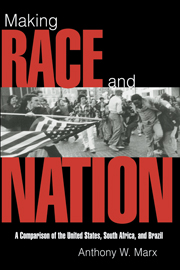1 - Introduction
Published online by Cambridge University Press: 05 June 2012
Summary
W. E. B. Du Bois called “the problem of the color line” the pivotal question for the twentieth century. In South Africa, the United States, and elsewhere, the century has brought both reinforcements of the color line and militant struggles against it. Momentous conflict has confounded expectations that racial domination and mobilization, supposedly archaic residues of another age, would simply wither away. Far from displacing race as an issue, industrialization, class conflict, rising nationalism, and state consolidation have actually spurred racially defined contention. As a result, struggle centers increasingly on state action or inaction. The end of Du Bois's fateful century challenges us to rethink the links between racial conflict and nation-state building and development.
The initial driving force of this study is a major puzzle of widespread concern: What accounts for twentieth-century race relations? This question can be broken down into more manageable parts, though each impinges on the others. How, and to what extent, were such relations prefigured by earlier history? How did political and economic processes during this century shape divergent racial orders? And how did challenges from below emerge, interact with, and force changes in racial domination from above? My approach to these issues is comparative, rejecting U.S. exceptionalism without diminishing the distinctiveness of that or other cases.
Discrimination according to race predates this century and became pervasive where Europeans sought to justify their rule.
- Type
- Chapter
- Information
- Making Race and NationA Comparison of South Africa, the United States, and Brazil, pp. 1 - 26Publisher: Cambridge University PressPrint publication year: 1997

